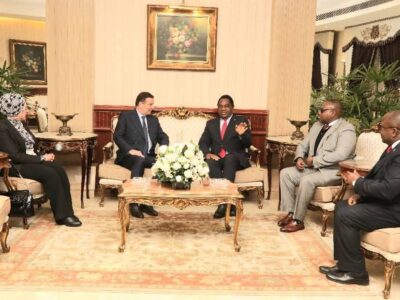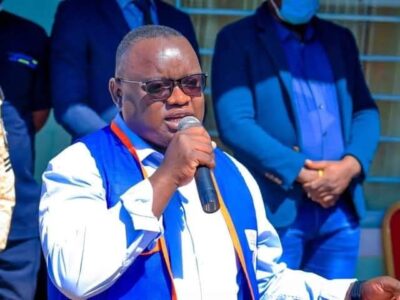Chief Government Spokesperson, Cornelius Mweetwa, has cautioned government officials and UPND members against commenting on the Zambia Conference of Catholic Bishops’ (ZCCB) pastoral letter.
Mweetwa acknowledged that the government had taken note of the letter, which raised several concerns and allegations.
He made this statement during a media briefing in Solwezi District, North-Western Province, on Saturday, following a tour of Barrick Lumwana Mine with fellow Cabinet Ministers.
He stated that the Catholic Church remained a longstanding partner of the government, and engagements with the Church would take place in due course.
“The current government will continue its trajectory of rebuilding the economy, fighting corruption, and fulfilling our electoral promises,” Mweetwa added.
He reiterated that the government is committed to integrity and transparency, with efforts focused on addressing both past and present corruption.
The ZCCB’s pastoral letter, dated November 15, raised concerns about the state of the economy, the political landscape, and the fight against corruption.
It also called on the government to defer constitutional amendments until after the 2026 general elections, citing insufficient time to build consensus on the process.
In the letter, ZCCB President Archbishop Ignatius Chama highlighted the lack of an agreed roadmap for constitutional review and stressed the urgency of electoral reforms ahead of the 2026 elections.
“Electoral reforms are critical for a developing democracy like Zambia,” Archbishop Chama stated. “However, with only 19 months remaining before the elections, we urge the government to reconsider proceeding with the exercise to avoid perceptions of bias toward the ruling party.”
The letter also addressed concerns about Zambia’s judiciary. Archbishop Chama urged Chief Justice Mumba Malila to expedite pending cases, including unresolved intra-party disputes involving the opposition Patriotic Front (PF).
“A loss of public faith in the judiciary is a recipe for chaos and lawlessness,” Chama warned, criticizing controversial judge dismissals and delays in case adjudication.
He proposed amendments to strengthen the Judicial Complaints Commission (JCC) and the Judicial Service Commission (JSC), advocating for transparent appointment processes and parliamentary confirmation of commissioners by a two-thirds majority.
“These changes would enhance the independence and quality of our justice system,” Archbishop Chama concluded.
Meanwhile, Cornelius Mweetwa (Information and Media), Paul Kabuswe (Mines and Minerals Development), Brenda Tambatamba (Labour), and Robert Lihefu (North-Western Province), all cabinet ministers, were informed by the management of Lumwana Mine that there were plans to double its copper production from the current 120,000 metric tonnes to 240,000 metric tonnes per annum by 2028.
The anticipated increase in production was attributed to the stable policy environment created by the UPND-led government.
The Ministers were informed that the workforce at Barrick Lumwana was 99 percent Zambian, with expatriates making up just 1 percent. Of the Zambian workforce, 40 percent are youth from Kalumbila District.
With the ongoing expansion project, the mine is expected to increase its workforce to 8,500 by 2028, up from the current 2,500, with an additional 550 permanent jobs created.
Mines Minister, Paul Kabuswe, stated that the target of reaching 3 million metric tonnes of copper production by 2030 was achievable, given the projected output from mines like Barrick Lumwana.
“The government is committed to ensuring that the benefits of this growth trickle down to local communities through increased tax revenues and job opportunities,” Kabuswe said.
The Minister also urged mining companies in North-Western Province to prioritize environmental protection and avoid pollution.
He called on Barrick Lumwana to collaborate with local leadership and create platforms for transparent communication, ensuring the community is well-informed about the mine’s contributions.
“There is also a need for contractors to respect the rights of their employees,” Kabuswe added.
He proposed that mines sign contracts with contractors that outline binding terms and conditions, ensuring workers were treated fairly and paid agreed salaries.
However, the Zambia Conference of Catholic Bishops (ZCCB) has expressed concern over declining mining revenues, despite the government securing partners for key mines such as Konkola, Mopani, and First Quantum Minerals.
ZCCB president, Archbishop Ignatius Chama, reiterated the message from the November 2023 Pastoral Statement, urging the government to increase state shareholding in foreign mining companies and reconsider the tax holidays previously granted to them.
In a pastoral letter released in Lusaka on Saturday, Chama emphasized that mining was the backbone of Zambia’s economy and called on the government to prioritize boosting copper production while maximizing revenue from this critical sector.
“Mining should not only drive economic growth but also serve the interests of all Zambians, ensuring sustainable development and equitable wealth sharing,” Chama said.
He acknowledged the country’s efforts to diversify the economy by focusing on agriculture but stressed that mining’s role remained central to Zambia’s economic growth.
Chama also urged the government to establish a transparent and accountable legal framework for mining operations, with an emphasis on environmental protection, fair taxation, and workers’ rights.
“These measures are vital to protecting Zambia’s natural resources and ensuring that the benefits of mining are shared by all citizens, not just a select few,” he stated.
He further noted that the current economic challenges have affected nearly all sectors of life.
“Businesses across industries such as manufacturing, education, and entrepreneurship have had to reduce or halt operations, resulting in job losses and decreased output,” Chama explained.
He also highlighted the energy crisis, attributing it to the country’s reliance on hydropower.
“The impact has been too severe to ignore. To mitigate risks associated with hydropower dependence, the government must prioritize diversifying its energy sources as a long-term strategy,” he emphasized.
WARNING! All rights reserved. This material, and other digital content on this website, may not be reproduced, published, broadcast, rewritten or redistributed in whole or in part without prior express permission from ZAMBIA MONITOR.












Comments